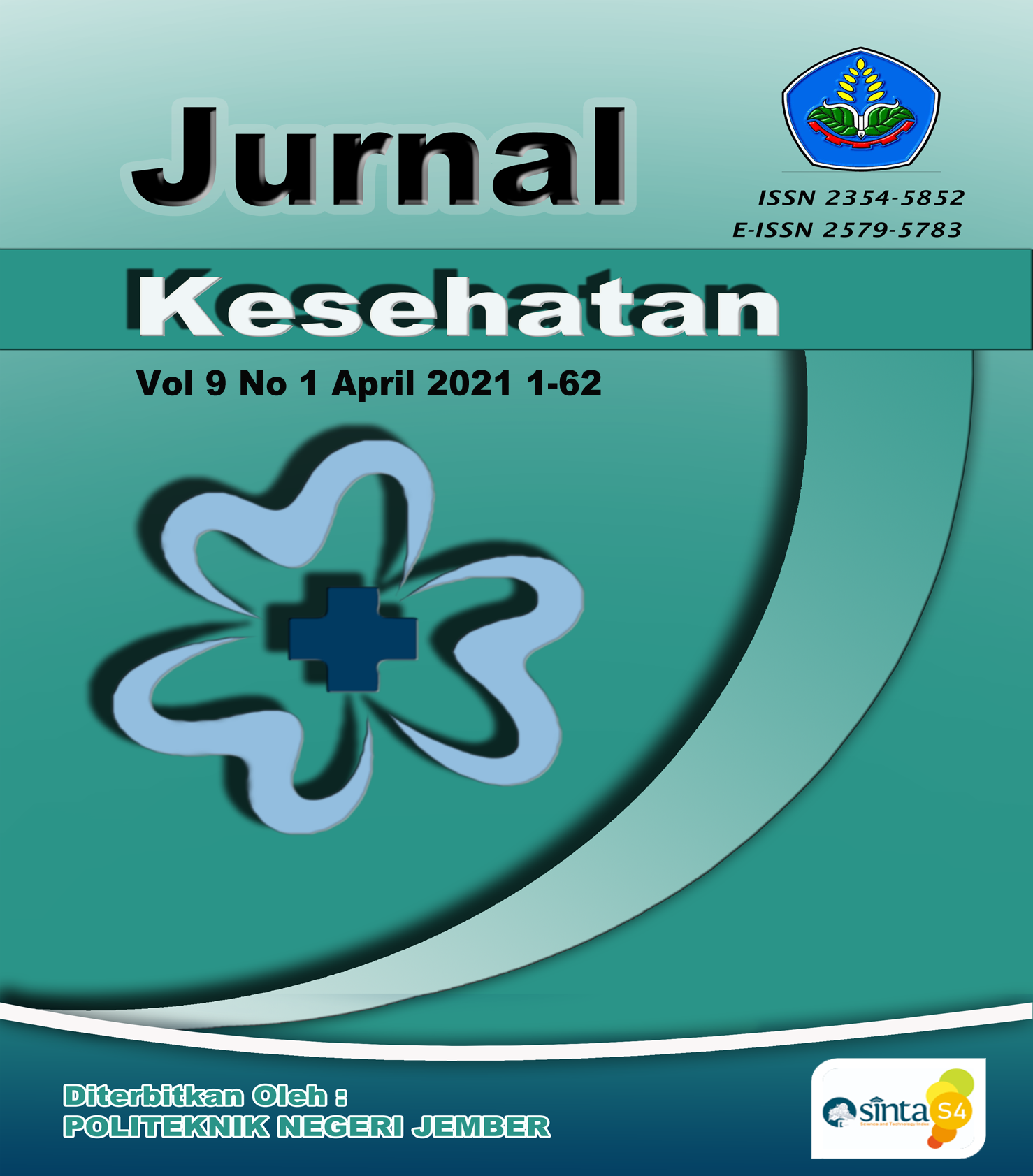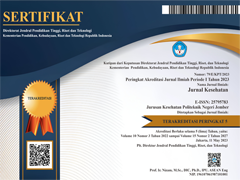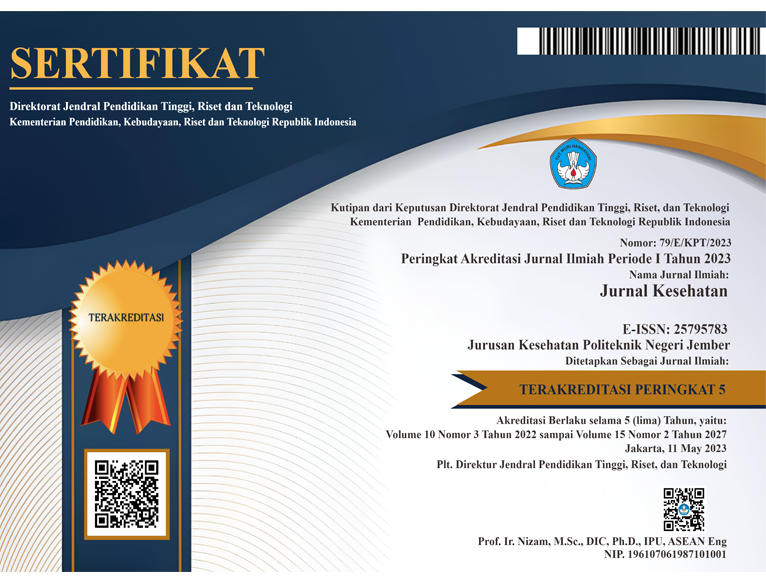
Hubungan Tingkat Pengetahuan Orang Tua dengan Status Gizi Anak Usia 7-12 Tahun
DOI:
10.25047/jkes.v9i1.198Downloads
Abstract
Double Burden of Malnutrition is a nutritional problem that is currently facing Indonesia. Parental knowledge is reported as a risk factor that can affect the nutritional status of children. This study was aimed to analyze the relationship between the level of parental knowledge and the nutritional status of children aged 7-12 years. This study was an observational analytic with cross sectional approach. The research was conducted at the Jember Police Primary Clinic during May 2020, with a large sample of 40 parents who have children aged 7-12 years. The results showed that the distribution of respondents who had good knowledge was 70%, sufficient knowledge was 27.5% and less knowledge was 2.5%. The distribution of respondents with under weight status was 7.5%, normal status was 87.5% and over weight status was 5%. The level of knowledge has a significant (p = 0.021), strong (dxy = 0.613) and positive relationship to the nutritional status of children aged 7-12 years. Knowledge of children's growth and nutritional status is very important for parents because it has the potential to influence parents in caring for and caring for their children, especially in meeting nutritional needs.
Keywords: Children, Knowledge, Nutritional
Keywords:
pengetahuan, gizi, anakReferences
Alfiana, D., Pratiwi, W dan Sanif, M.E. (2019) The Correlation Between Education, Work, AndMaternal Knowledge On Complementary Feeding With6-24 Months' Nutritional Status. Proceedings of International Conference on Applied Science and Health. 4.
Aljohani, A. and Abdulrahman, M. (2020) ‘The knowledge of mothers about children malnutrition and associated factors’, International Journal of Medicine in Developing Countries, 4, pp. 7–11.
Asriani, Fajriansi, A. and Sumira (2013) ‘Hubungan Antara Pola Asuh, Pengetahuan Dan Sikap Orangtua Terhadap Status Gizi Balita Di Kelurahan Lampa Kecamatan Duampanua Kabupaten Pinrang’, Jurnal Ilmiah Kesehatan Diagnosis, 1(6), pp. 310–319.
Boah, M., Azupogo, F., Amporfro, D. A., & Abada, L. A. (2019). The epidemiology of undernutrition and its determinants in children under five years in Ghana. PloS one, 14(7), pp.1-23
Budiarto, E. (2003) Metodologi Penelitian Kedokteran: Sebuah Pengantar. Jakarta: EGC.
Fadare, O., Amare,M., Mavrotas,G., Akerele,D dan Ogunniyi, A. (2019) ‘Mother’s nutrition-related knowledge and child nutrition outcomes: Empirical evidence from Nigeria. PLoS ONE, 14(2), pp. 1–17.
Fakhrudin, H. (2007) Sosiologi:Menyelami Fenomena Sosial di Masyarakat. 1st edn. Bandung: PT Setia Purnama Inves.
Habyarimana, F., Zewotir and Ramroop (2016) ‘Key determinants of malnutrition of children under five years of age in Rwanda: Simultaneous measurement of three anthropometric indices’, African Population Studies, 30(2), pp. 2328–2340.
Kemekes RI (2020) Pokok-pokok Renstra Kemenkes 2020-2024.
Lee, S. J. and Ryu, H. K. (2018) ‘Relationship between dietary intakes and the double burden of malnutrition in adults of Malang, Indonesia: An exploratory study’, Nutrition Research and Practice, 12(5), pp. 426–435.
M, M. E., Kawengian, S. E. S. and Kapantow, N. H. (2015) ‘Hubungan Antara Pengetahuan Ibu Tentang Gizi Dengan Status Gizi Anak Umur 1- 3 Tahun Di Desa Mopusi Kecamatan Lolayan Kabupaten Bolaang Mongondow Induk Sulawesi Utara’, Jurnal e-Biomedik, 3(2).
Majestika, S. (2018) Status Gizi Anak dan Faktor yang Mempengaruhi. Yogyakarta: UNY Press.
Nguyen et al. (2017) ‘Factors influencing maternal nutrition practices in a large scale maternal, newborn and child health program in Bangladesh’, PLoS ONE, 6.
Notoatmodjo, S. (2010) Ilmu Perilaku Kesehatan. Jakarta: PT Rineka Cipta.
Numaliza, N. and Herlina, S. (2018) ‘Hubungan Pengetahuan dan Pendidikan Ibu terhadap Status Gizi Balita’, KESMARS: Jurnal Kesehatan Masyarakat, Manajemen dan Administrasi Rumah Sakit, 1(1), pp. 44–48.
Pravana, N. K. et al. (2017) ‘Determinants of severe acute malnutrition among children under 5 years of age in Nepal: A community-based case-control study’, BMJ Open, 7(8), pp. 1–7.
Regar, P. M. and Kairupan, J. K. (2016) ‘Dalam Mencegah Penyakit Kelamin Di Kota Manado’, Jurnal Holistik, (17), pp. 1–20.
TNP2K (2017) Pemilihan 10 Desa Prioritas Di 100 Kabupaten/Kota Prioritas Penanganan Kemiskinan Dan Stunting, Kementrian Koordinator Bidang Pembangunan Manusia dan Kebudayaan, Kementrian PPN/Bappenas. Available at: http://www.cegahstunting.id.
UNICEF (2012) ‘Maternal and Child Nutrition’, IssueBriefs, pp. 1–6.
WHO (2016) Strategic Action Plan to Reduce the Double Burden of Malnutrition in the South-East Asia Region 2016-2025. Geneva.
Zerfu and Biadgilign (2018) ‘Pregnant mothers have limited knowledge and poor dietary diversity practices, but favorable attitude towards nutritional recommendations in rural Ethiopia:evidence from community-based study’, BMC Nutrition, 2.
License
Copyright (c) 2021 Jurnal Kesehatan

This work is licensed under a Creative Commons Attribution-ShareAlike 4.0 International License.
Authors who publish in this journal agree to the following terms:
1. Copyright belongs to the medical journal as a publication
2. The author retains copyright and grants the journal rights to the first publication carried out simultaneously under a Creative Commons Attribution License which allows others to share the work with an acknowledgment of the author's work and initial publication in this journal.
3. Authors may enter into separate additional contractual arrangements for the non-exclusive distribution of the work (eg sending it to an institutional repository or publishing it in a book) with acknowledgment of initial publication in this journal.
4. Authors are permitted and encouraged to post work online (eg in institutional repositories or on their websites) before and during the submission process, as before and larger citations of published work (see Effects of Open Access).
Selengkapnya tentang teks sumber ini













